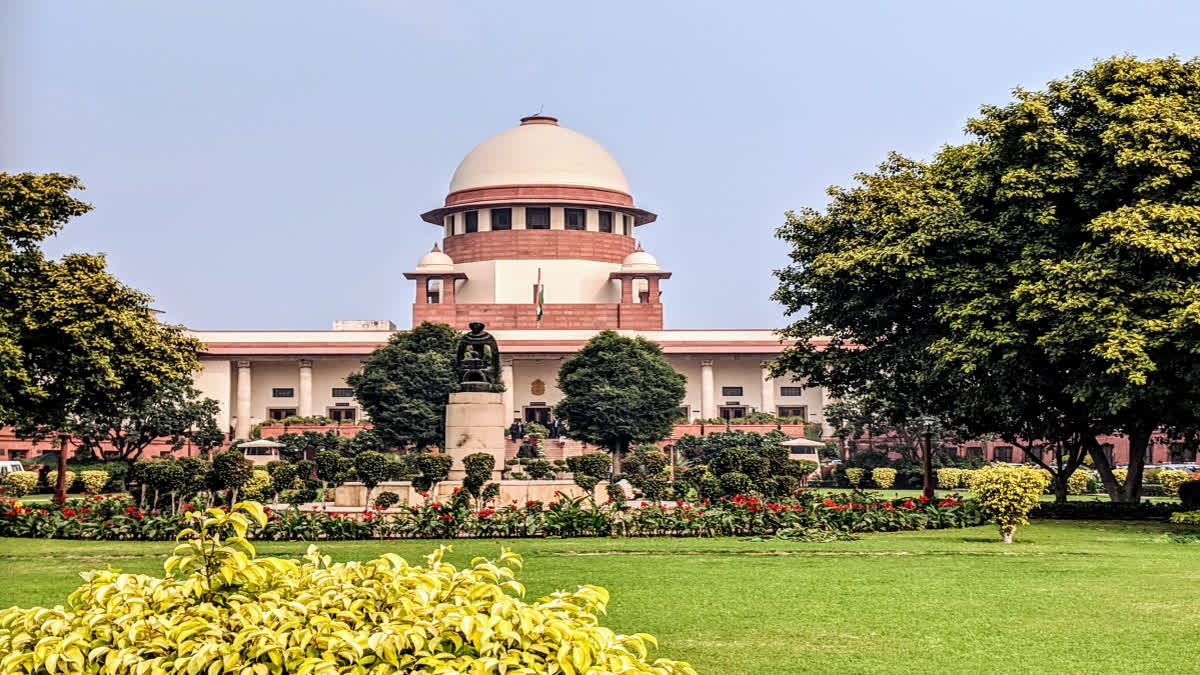New Delhi: The Supreme Court on Wednesday shot a volley of probing questions at Solicitor General Tushar Mehta, representing the Centre, asking him which authority was responsible for enforcing the Delhi Special Police Establishment (DSPE) Act, under which the CBI was constituted and the agency operates.
During the intense hearing, a point was reached, when Mehta said: "I never knew such a question would come?", and the court replied, "We are entitled to ask the most absurd of questions".
The apex court was hearing an original suit filed by West Bengal against the Centre, challenging a spree of cases filed by the CBI despite the state government, in November 2018, withdrawing the "general consent" accorded to the CBI to conduct a probe or carry out raids in the state.
Mehta submitted before a bench comprising Justices B R Gavai and Sandeep Mehta that the Department of Personnel and Training (DoPT) never registers a case and it's only a cadre controlling authority. Justice Gavai said DSPE Act comes under whose supervision.
The bench observed: "We are under the Ministry of Law and Justice so far as funds are concerned and any question related to the judiciary is answered by this ministry, therefore DSPE is under which ministry?"
Mehta said if it is a question of transfer, posting, departmental inquiry, pay scale etc., then it comes under DoPT, for that purpose only and reiterated that DoPT cannot direct registration of an FIR.
The bench asked Mehta: "Even if the CBI is an instrumentality of state for the purpose of Article 12, for the purpose of Article 131 it is not". Mehta said there are several public sector undertakings, they are created by the government and maybe by the statute or not by statute, and the government may have administrative control, that does not mean their day-to-day functioning is also controlled by the Centre.
"They (West Bengal) are aware that CBI cannot be joined and that is why they have joined a party against whom there is no cause of action….," said Mehta. The Centre's top law officer, while referring to an argument made by the other side that the CBI is the police force of the Union, said it is a devastating statement and "I will show why. Police force of the Union is under the India Police Act. CBI is not the police force of the Union".
Justice Gavai said the Centre may constitute a special police force. Mehta said correct, but that does not mean "CBI is the police force of the Union and police is not a subject entrusted into the central government", and "there is no concept in our country of a police force of central government".
Justice Mehta queried why section 5 subclause (1) (DSPE Act) gives the power to the central government to define the jurisdiction and powers of the DSPE? Mehta said somebody will have to. "That somebody is DoPT, that is what they (West Bengal government) say. Who else in the central government, please tell us?," said the bench. Mehta said the director does that.
The bench asked how can the director be the central government and is the director and central government the same? Mehta said he is not saying that and if his arguments are understood that director and central government are same then he has nothing more to add. "
That is what came from you," said Justice Gavai. Mehta insisted that he never made that submission.
Justice Gavai said, “When my learned brother put a query that directions are to be issued under section 5 by the central government..... it has to be done by the director?"
It was argued before the bench that the Centre is coming into the picture only in connection with the jurisdiction, for offences or classification of offences, of the DSPE Act. "Which department would define this?" asked the bench.
The bench further queried Mehta which department would define the territorial jurisdiction aspect? Mehta said suppose DoPT. The bench insisted that it wants a specific answer.
Mehta said, "I think DoPT, I never knew such a question will come?" Justice Mehta replied, "We are entitled to ask the most absurd of questions". Mehta said "it is not absurd and has your lordships taken it that way…". Justice Mehta said, "No, you said that you did not expect this question to come….".
Mehta said I think it is DoPT. "Even if appointments are concerned, it has to be by some department of the Union of India….it has to be either DoPT or MHA (Ministry of Home Affairs)," said the bench, adding that it cannot be the director who can issue notification under Section 5 (of the Act).
Mehta said certainly the director cannot. Mehta further added that the power to confer territorial area and the power of investigation is one thing but that does not mean that Centre has the power to direct CBI to register an offence in an area in Rajasthan, for a particular offence.
"The prayer (of the West Bengal government) is to direct DoPT not to register an offence…," said Mehta.
Justice Mehta said the relief does not stop at registration and it is all encompassing including investigation, your argument is alright and added that Centre's claimed that the DoPT do not direct registration but authorise the agency to proceed to another state for investigation, and further asked, "who would be the authority?". Mehta said the central government.
The bench also made it clear that it will not allow either the Centre or the West Bengal government to raise any political issue during the hearing. "We are only on a technical issue, why should we go into the political part," the bench said.
In connection with the scheme of the Act, the bench, citing an example, said the Centre issues a notification in connection with Maharashtra, and if Maharashtra does not give its consent except the order of the court would the CBI be able to investigate.
Mehta replied in negative and pointed out that the court is going into the merits of the matter now. Earlier in the day, responding to Centre's claim that CBI is not under its control and is an independent probe agency, senior advocate Kapil Sibal, representing the West Bengal government, said Section 4(2) of DSPE Act suggests it's under DoPT.
Sibal argued when a question on CBI is asked in the Parliament it's a minister of state in the central government in charge of DoPT who answers the question and not the CBI. Sibal stressed that even the cases and affidavits in courts on behalf of CBI are filed by DoPT.
After hearing submissions, the top court reserved the judgment on maintainability of the original suit filed by West Bengal against the Centre challenging cases filed by CBI despite withdrawal of general consent in 2018.
The West Bengal government has filed an original suit against the Centre under Article 131 of the Constitution, alleging that the CBI has been filing FIRs and proceeding with its investigation, despite the state having withdrawn the general consent to the agency to probe cases within its territorial jurisdiction.


